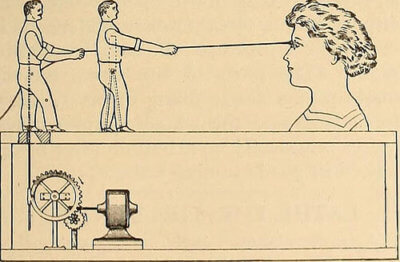The Psychodynamic Approach – What Therapies Use It and Is It For You?

By: Lance Shields
by Andrea M. Darcy
The psychodynamic approach is one of the older forms of talk therapy, moving things a step forward from Freud and psychoanalysis.
What is the psychodynamic approach?
It shares with psychoanalysis a belief that in order to understand the ways we think and act in the present, we need to explore both our unconscious and our past experiences and relationships.
The difference is that the psychodynamic school of thought also looks at conscious thinking. And it sees the client-therapist relationship as a crucial part of the therapeutic process.
The aim of therapies that come under the psychodynamic umbrella is thus to help you develop self-awareness and control of your present by understanding your past.
Therapies that use the psychodynamic approach
Psychoanalytical psychotherapy, which psychodynamic therapy arose from, is still practised today. You can learn more in our article on Freud and Psychoanalysis.
Many practitioners also still practise straight psychodynamic psychotherapy. Read our article ‘Is Psychodynamic Psychotherapy for You?” to understand more.
Aside from these major players, the below forms of therapy are also seen as coming under the psychodynamic umbrella.
Dynamic Interpersonal Therapy (DIT)
Dynamic interpersonal therapy is a short-term, very structured type of psychotherapy that helps you change your moods by understanding and changing the ways you interact with others.
It helps you identify the patterns of relating you learned growing up that are causing you trouble in your present-day life. You are then helped to try new ways of relating that are less stressful and lead to better results.
Recommended by the NHS for depression, DIT can be seen as a sort of ‘distilled’ version of psychodynamic therapy. It’s a good therapy for those who are curious to try out psychodynamic therapy.
Dynamic interpersonal therapy can help with:
Emotionally Focused Therapy (EFT)
Emotionally focused therapy is a short-term treatment for couples and families. It helps develop greater emotional intelligence and security within relationships.
EFT helps you to recognise the repetitive emotional responses and positioning you and your partner or family member are stuck in. How can you better express and organise the emotions, change the positions, and develop greater security and connection between you?
Emotionally Focused Therapy can help with:
- relationship issues
- communication issues
- control issues
- attachment issues
- emotional repression
- depression
- managing life change.
Jungian Therapy
Jungian therapy helps you explore the many layers of your unconscious mind. This frees you understand yourself, recognise and change any patterns that hold you back, and live a more powerful, balanced, and authentic life.
Jung was originally a colleague and dear friend of Freud. But an intellectual disagreement between them ended their connection (see our article on Jung vs Freud).
Jung believed that the unconscious wasn’t where we hid our fears and desires. We also all hold the collective unconscious, a layer that connects us to others and to all of history. The archetypes we find there are tools of wisdom and empowerment.
Jungian therapy can help you with:
- understanding your dreams
- self-identity and low self-esteem
- moving forward in life
- connecting with others
- depression and anxiety
- grief and trauma
- phobias
- addictions.
Mentalisation-based therapy (MBT)
Mentalisation helps you better understand the ways others think and act. It is particularly useful if your assumptions and reactions around other people cause you troubles in your relationships.
It’s human nature to constantly be trying to figure out what other people are feeling and thinking and feeling. This process is called ‘mentalising’. Some of us, particularly if we have a personality disorder, have faulty mentalising processes that mean we think we understand others but then get it wrong, or always upset others.
Mentalisation-based therapy helps you to mentalise better, listening more carefully to your own thoughts before reacting, and learning to see others more clearly.
Mentalisation based therapy can help with:
- borderline personality disorder
- other personality disorders
- depression and anxiety
- relationship problems
- fear of intimacy and trust issues
- addictions and eating disorders
- low self-esteem
- trauma.
Relational Psychotherapy

By: Thomas Rousing
Relational psychotherapy helps you connect better to others, so you can sustain relationships and feel better about yourself.
Strong relationships can really help our emotional wellbeing. But if we think and feel negatively about ourselves, and if our relationships growing up were not secure, we can struggle to form real bonds.
A Relational therapist forms a strong relationship with you so you have an experience of trust to work from. He or she then helps you understand the ways you disconnect and push others away and how you can change this.
Relational psychotherapy can help with:
- family issues
- fear of intimacy
- relationship problems
- handling life change
- workplace issues
- handling emotions
- anxiety and depression
- loneliness.
Interpersonal psychotherapy
A short-term therapy, interpersonal psychotherapy (IPT) that helps you improve the ways you relate to others, create and accept social support, and respond more effectively to life’s challenges.
Interpersonal psychotherapy can help you with:
Systemic therapy
Systemic therapy, often called ‘family therapy’, works to repair the ‘system’ that a family or group has created amongst themselves. You lear to recognise and troubleshoot the ways that the communication and behaviours of each member are affecting the whole.
A systemic counsellor does not tell anyone what to do or take sides, but helps you all learn to communicate, ask good questions, and empathise with each other. He or she will meet with you as a group but might also meet with some members of your family individually.
Systemic therapy can help you with:
- divorce and separation
- illness and bereavement
- non-traditional families
- parenting issues
- eating disorders
- addiction
- depression.
Would you like to try a talk therapy that uses a psychodynamic approach? Harley Therapy connects you with experienced and registered therapists across the UK, or globally via online.
 Andrea M. Darcy is a mental health and wellbeing expert and writer. She also runs a consultancy helping people find their perfect therapy and therapist. Follow her on Instagram for useful life tips @am_darcy
Andrea M. Darcy is a mental health and wellbeing expert and writer. She also runs a consultancy helping people find their perfect therapy and therapist. Follow her on Instagram for useful life tips @am_darcy





